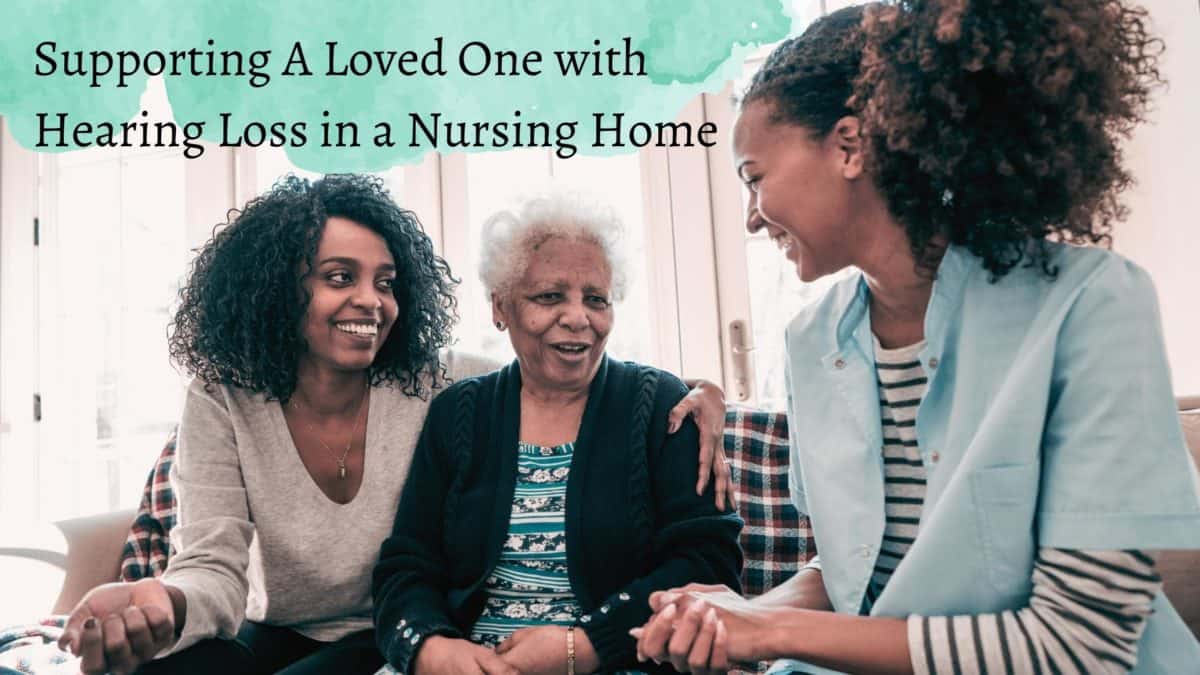Do you have a loved one living in a nursing home? If your loved one has hearing loss, there are a few ways you can support them with their hearing loss. This includes making sure they wear their hearing aids, that the hearing aids match their hearing needs, and that the hearing aids are in great condition.
Why Hearing Is Important
Hearing is one of our most important senses. Hearing connects us with the people around us. Being able to hear conversations and share special moments with loved ones brings a lot of joy to life. And for older adults living in a nursing home, hearing is even more important. Hearing loss can make it challenging to communicate with staff or connect with other residents. It can reduce overall quality of life and make your loved one feel isolated and alone. Hearing loss can also cause feelings of social anxiety, stress, and even depression.
Tips to Support a Loved One with Hearing Loss in a Nursing Home
If your loved one has hearing loss, there are a few things you can do to help them hear. These easy steps will help them remember to wear their hearing aids and keep them from misplacing their devices. Some small changes can make a big difference.
Get to Know the Staff
As you spend more time visiting your loved one, you’ll get to know the staff. You can talk to staff members about policies related to hearing aids, or gently remind them to encourage your loved one to wear their hearing aids. You can also ask them to help put hearing aids away safely in the evening or let you know if the batteries need replacing or to be charged.
Label the Hearing Aids
Your loved one isn’t the only person wearing hearing aids in the nursing home, so label both hearing aids and the storage or charging case. It’s easy to misplace a hearing aid, and if they’re not labeled clearly, they may be thrown away or wind up in the lost and found.
Use a Container for Nighttime Storage
Find and label a sturdy plastic container or hearing aid case and put it by your loved one’s bed. Get into the habit of storing the hearing aids there overnight, and let staff know where to put the hearing aids. This routine can help your loved one remember to put on their hearing aids every morning. Having a designated storage container also makes it easier to keep track of the hearing aids.
If your loved ones’ hearing aids are rechargeable, label the charger and also place that on the nightstand. Rechargeable hearing aids must be charged overnight, every night.
Encourage Cleaning
Hearing aids work better if they’re properly cleaned and maintained. Encourage your loved one to clean their hearing aids at night. They can wipe the hearing aid with a dry soft cloth before putting them into the storage container. When you visit, you can do a more thorough cleaning to remove any build-up of earwax or dust on the devices, paying close attention to the earpiece as this is the most important part of the hearing aid for sound to enter their ears.
It’s also important to check the batteries regularly if their devices are disposable battery operated. Your loved one may not be able to change the hearing aids batteries, so check the batteries when you visit and make sure to replace them as soon as possible.
Get Hearing Aid Checkups
If your loved one’s hearing aids aren’t working properly, they’ll be less likely to wear them. Every few months, bring in the hearing aids and let us do a thorough cleaning and checkup. We’ll make sure the hearing aids are in perfect working order and help your loved one hear.
Schedule Yearly Hearing Tests
Your loved one should get a hearing test every year to make sure their hearing aids match their hearing needs. During the hearing test, we’ll find out if their hearing has changed and if their hearing aids still fit perfectly. If they need some extra help hearing, we’ll recalibrate the hearing aids to match your loved one’s hearing needs.
The Hearing Health Center of Houston
If you’re supporting a loved one with hearing loss, we’re here to help. Our hearing health specialists will be with you and your loved one every step of the way. We encourage you to come with your loved one to appointments so that together we can make sure your loved one has the hearing aids they need. We can also give you a few more tips for supporting your loved one with hearing loss.


